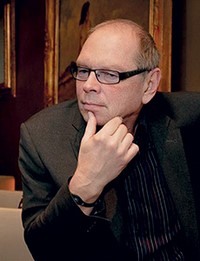 Some things will become natural. Just have a look at our approach to music. First, music was live and then the first phonographs and record players appeared, with recorded music. This was condemned by many people as something unnatural, which can never replace live music. Then vinyl records came, replaced by CDs – many professionals claimed they could never reach the same level of sound fidelity as vinyl records. This was further followed by downloading music from the Internet and its reproduction, today clearly the preferred way of listening to music. However, something else emerged too: nowadays, with the help of software, you can easily “compose” all sorts of music, such as Latin, rap, or imitate Michael Jackson.
Some things will become natural. Just have a look at our approach to music. First, music was live and then the first phonographs and record players appeared, with recorded music. This was condemned by many people as something unnatural, which can never replace live music. Then vinyl records came, replaced by CDs – many professionals claimed they could never reach the same level of sound fidelity as vinyl records. This was further followed by downloading music from the Internet and its reproduction, today clearly the preferred way of listening to music. However, something else emerged too: nowadays, with the help of software, you can easily “compose” all sorts of music, such as Latin, rap, or imitate Michael Jackson.
Equally rapid will probably be our adaptation to cars without drivers. Reasons for owning cars will disappear, economy of car operation and practical approach will prevail. Most accidents and their impacts will disappear, as well as traffic jams, most garages, and parking places which originally displaced parks and forests.
It is also worth mentioning the so-called Turing´s test. This genius English mathematician living in the middle of the 20th century anticipated that within 50 years, most people would not be able to distinguish in many situations whether they communicate with a human being or machine. As soon as 2008, objects of synthetic intelligence deceived 25% of such contestants. What Turing meant was the same as I mentioned in the previous paragraph. The same way as the meaning of the word “recorded music” was changing or a car is changing into public transport, the meaning of “thinking and intelligence” will change too. Don´t you feel sometimes when asking your artificial assistant Siri in natural language that she is taking her time to think? Apple calls her an intelligent assistant.
- Sensors will advance as well, increasingly perfect and cheaper. They will not only be more efficient, they will also serve as fashion gadgets. Not only smart watches but smart toilets too will become more and more commonly used.
- Many books have already been written about nanotechnologies. They penetrate through human cells and supply medicine or eliminate dust in smart paints.
- Renewable technologies will become increasingly cheaper. New batteries conserving energy will appear, continuously lighter and cheaper.
- Human behaviour will continue to change and many technologies will become “invisible” and will be perceived by future generations as natural. Money will disappear, and will be replaced by “finances”, similar to loans and mortgages, virtual and sometimes arising based on a promise.
Extract from a new book Digitální ekonomika
published by Albatros Media.
By Ivan Pilný
Member of the Parliament, ANO party
President of Tuesday Business Network

